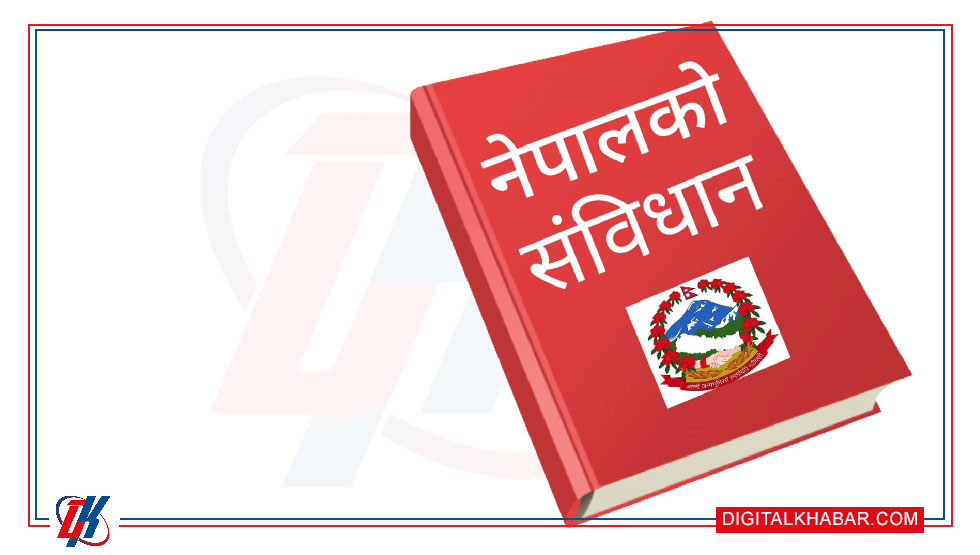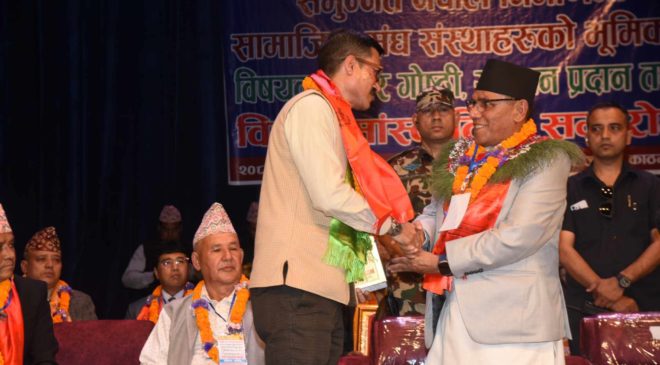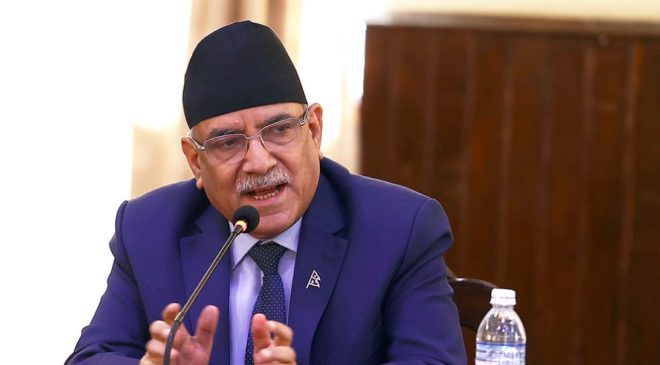Narayan Neupane
Kathmandu, Sept 17 (RSS): Coming September 19 or Ashoj 3 in the Nepali calendar marks the completion of six years of the promulgation of the Constitution through the historic Constituent Assembly (CA).
The existing country’s main law is claimed to be highly progressive document for its numerous distinct features like the provisions of inclusion, proportional representation social justice, right to equality, the right of women and so on.
Six years on, there are limited women faces in the Council of Ministers and the lack of election a deputy Speaker in the parliament have been taken as setbacks in the implementation of the Constitution.
Likewise, there are grievances from the people’s level that issues like the protection and promotion of the fundamental norms and values, good governance, building of a corruption-free society and participatory approach to the development project and people’s access to development were relegated to the back-burner and political parties are allegedly held accountable for the same.
It is argued that it would not be hard to advance towards the achievement of consolidated democracy, federalism along with development and prosperity if all political parties contributed from their respective sides by making short-term and long-term strategies. The current political atmosphere at home is not encouraging as the country is likely to be gripped once again by political imbroglio. The latest political developments are enough to say that the essence of the Constitution was likely to be killed due to the understanding and interpretation of the Constitution for the personal interests.
Democratic Socialist Party leader Laxman Lal Karna said despite reservations, the Constitution has given a clear outline in regard with the political system and course that the country should follow and move ahead accordingly and this aspect could be taken positively. As he argued, ”The Constitution was promulgated in haste and issues with it can be realized once we start to read it, but again it could amended for the interest of the people and the nation.”
The exercise of the Constitutional provisions primarily for forming a government and splitting the political parties instead of practicing them for genuine/good causes will create atmosphere capable of spoiling the achievements and the existing situation instead of dealing with it.
As he claimed, reputation of the government, judiciary and all bodies of the Federal Parliament has been eroded due to inability to correct the existing situation.
Incidences like the toppling the federal government, frequent reshuffling in the Province governments and the game of majority and minority and the recent government change have encouraged those forces who do not wish to see the stability in democracy and federalism;
National Assembly member Ram Narayan Bidari said, “It seems that whether the Constitution itself is problematic, but the failure to deal with the relatively flexible Constitution by the government, parliament and judiciary has provided a ground to doubt over the essence of the Constitution. But, our Constitution is itself not bad.”
The Constitution promulgated by the people’s representatives through CA has assimilated the principles of federalism, republic, secularism, proportional representation, free judiciary and separation of powers.
The parliamentary system adopted by Nepal is not solely like of the UK’s model. Rather, it is a revised document incorporating the provisions of parliamentary hearing, other noble provisions and is an exemplary one.
Stating that there should be a system of punishment for those who take oath to protect the Constitution but indulge in the abuse of power and authority, Bidari said, “The current Constitution is capable of serving for the causes of people and the country.”
He sought the provisions of punishment for those who indulge in the abuse of power and post instead of becoming honest to the protection of the constitution and democracy.
Experts believe that there is need of correction in the conduct of the political actors and practitioners of the Constitution which is clear about the provisions like federalism, inclusive participation, cooperation, coordination and understanding.
In view of Nepali Congress leader Pushpa Bhusal, the bright future of the nation is achievable if the executive, judiciary and legislature prepare a common work place with a clear strategy keeping the people-centered economic, social and cultural affairs at the centre by realizing the past mistakes.
Beside political goals, the Constitution a binding document of three parts, 308 articles and nine schedules aims to strengthen the federal democratic republic, to strengthen inclusive democracy, and achieve sustainable development by advancing economic policy so that the people at the grassroots level can feel the change and to address people’s aspirations for socio-economic changes.
Three-tier elections as demanded by the Constitution have already been completed, leading to the formation of governments at the federal, province and local levels.
But the then opposition party was not happy with the government formed following the post-Constitution elections.
People in the then government leadership were accused of failing to identify the priorities and needs of the country, and focus on the effective implementation of the constitution.
The question has been raised that why there is a delay in addressing the issue of implementing the political and economic inclusion of the provinces holding their own diversity and distinct features.
The opposition claims that the implementation of the constitution has been weakened as the government tried to run unilaterally instead of complying with the principle of separation of powers of the executive, judiciary and legislature.
Failure to patch up the intra-party feud of a particular party finally led to the split of political parties including a major one through an ordinance which seems against the spirit of the constitution. The intra-party conflict had led to the government change as well.
CPN (UML) Parliamentary Party Deputy Leader Subash Nemwang admitted that the practices taken during the implementation of the constitution has not only raised various questions among the people but has also created frustration.
“We have no interest in power-play game. We want to make it clear that we are always alert to the malpractices of the Constitution and laws,” he said, utilizing the time to express concern over a delay in the expansion of the Council of Ministers. As he said, the ruling party (ies) and opposition(s) have a competitive position, the smooth relationship between them is equally anticipated for the effective enforcement of the Constitution.
The Chair (both terms) in the former CA is of the view that the Constitution could be amended with the help of a people’s mandate.
“We have made a noble Constitution. The revised political and administrative map of the country has been issued. People have become empowered. There is no need for another people’s movement for another change. This is our substantial achievement,” he claimed.








